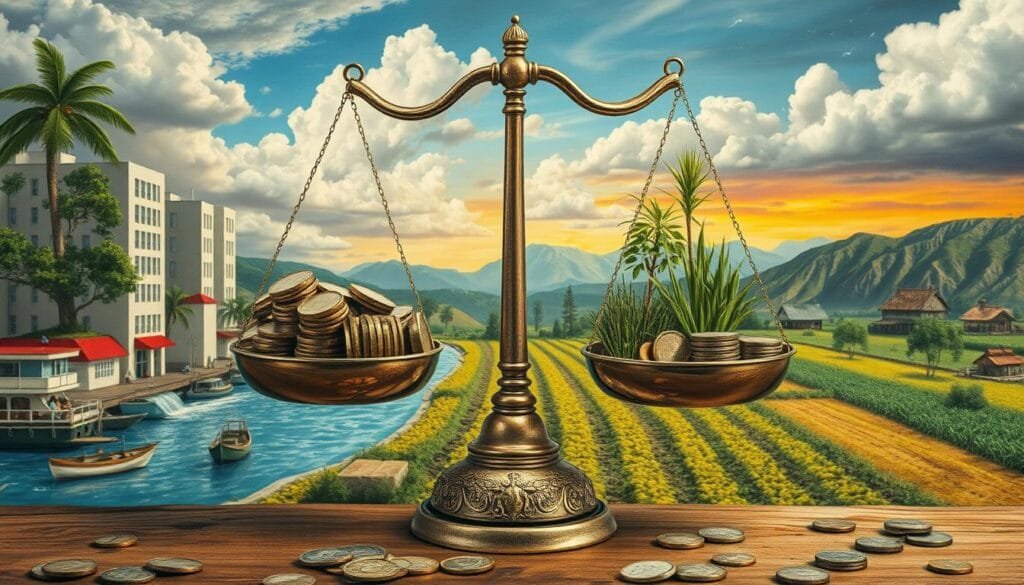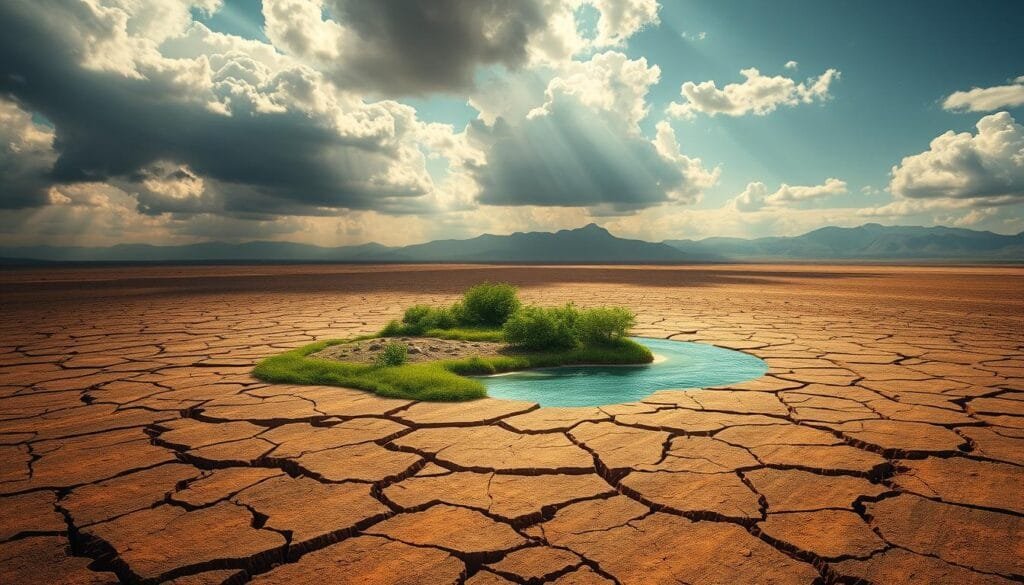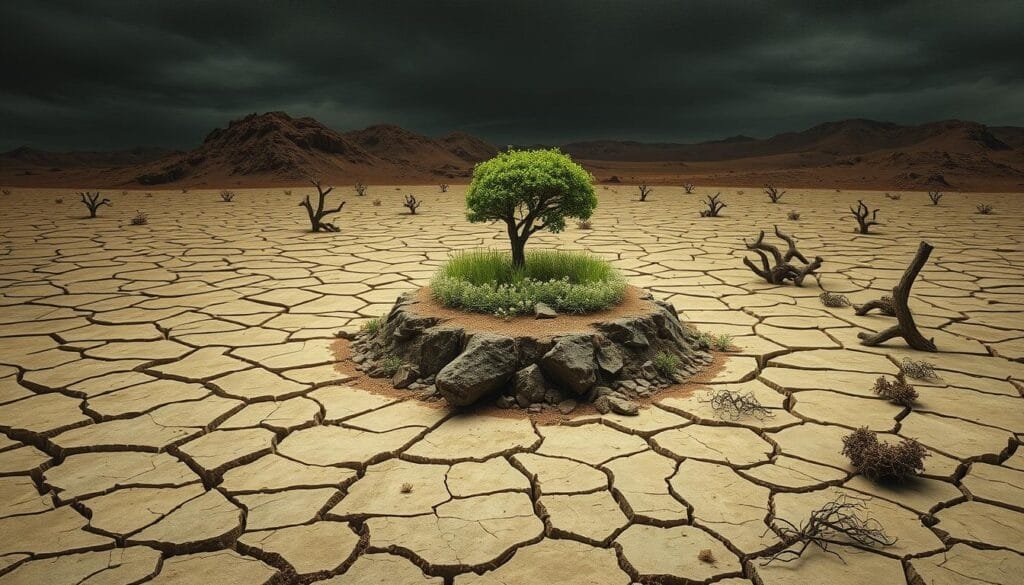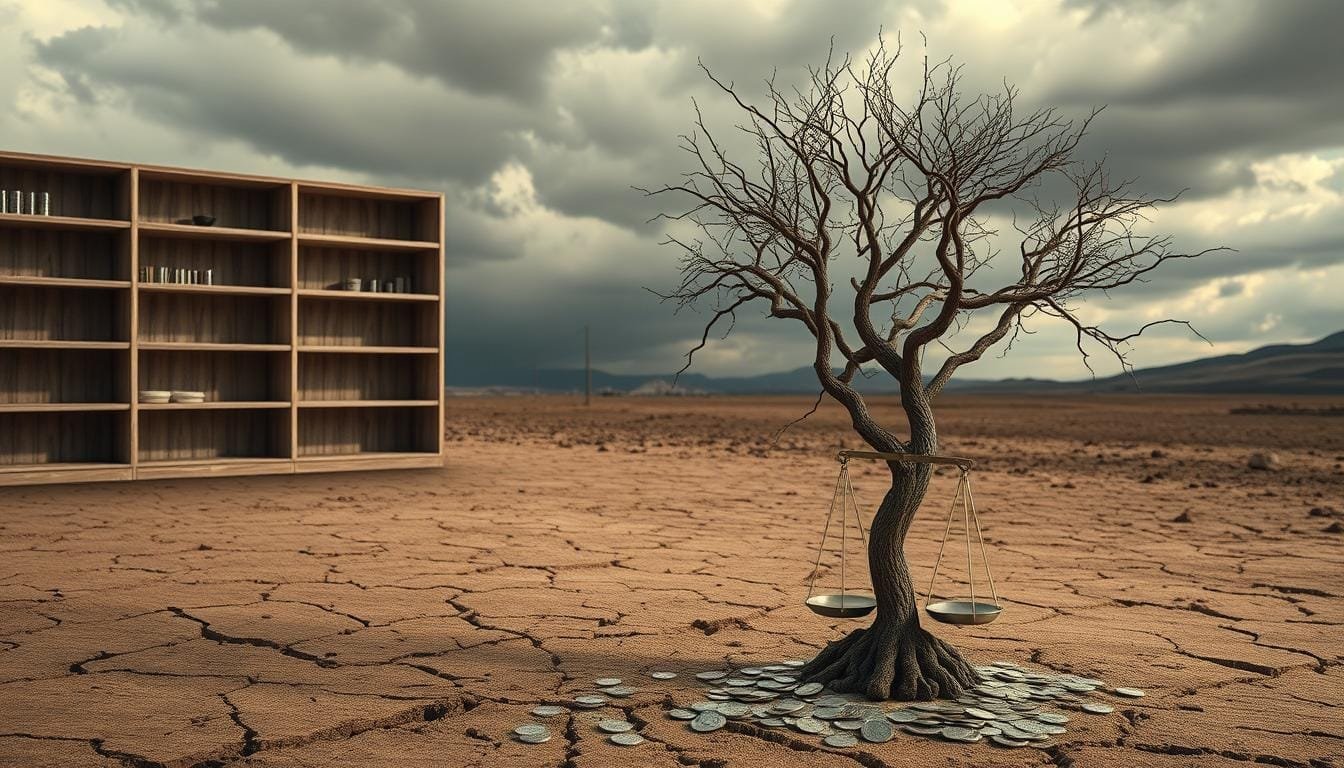Ever wondered why some goods and services are always just out of reach? This happens because of economic scarcity. It tells us about our limited resources versus our never-ending wants and needs. The concept shows why things like time, money, and even the vast land of the United States can’t fulfill our every desire.
The idea of endless resources is just an illusion. Economic scarcity means we’re always choosing between limited supplies and unlimited wants. This affects every choice we make, from what we buy to how governments plan. It makes us think hard about how to use what we have wisely.
Understanding economic scarcity helps us navigate the economy in our daily lives. It teaches us to make smart choices about using our limited resources. This knowledge is key to managing our personal and national economy better.
Key Takeaways
- Scarcity occurs when the demand for goods or services exceeds their availability.
- The U.S. labor force includes more than 158 million workers as of 2016.
- Resource limitations lead to critical trade-offs in economic decision-making.
- Factors of production—land, labor, capital, and entrepreneurship—are essential for producing goods and services.
- Economic goods are scarce, necessitating payment from consumers to obtain them.
- Scarcity drives opportunity cost, shaping our choices and priorities.
What is Scarcity in Economics?
Scarcity is a key idea in economics. It happens when there’s not enough resources to meet people’s endless wants. This problem makes us choose, facing trade-offs. These choices show up everywhere, from government spending to our personal lives, like where we live.
Definition of Scarcity
In economics, scarcity means not having enough resources to cover all desires. If demand is higher than supply and it costs nothing, goods are scarce. We must then decide how to use what we have wisely.
The Malthusian theory says that while people multiply quickly, food supply grows slowly. This can lead to not having enough resources. Malthus talked about ways to manage population growth. He mentioned natural limits and the difference between not having enough because of absolute limits or varying needs.
Examples of Scarcity in Everyday Life
We see scarcity every day. In the U.S., there’s only so much land, affecting where we can live and house prices. There are more than 167 million workers but not enough jobs for everyone. Even clean air is getting hard to find because of pollution and high demand.
Scarcity also hits schools and local governments. Schools can only teach so many students at a time. Cities must choose how to spend their money, balancing needs like safety and education. Even at the national level, choices between spending on the military or the environment show scarcity’s impact.
Why Scarcity is a Fundamental Concept in Economics
Scarcity is a key idea in economics. It affects how we use resources, deal with changes in supply and demand, and consider opportunity costs. It makes us think about how to best distribute what’s limited to meet various needs and wants. Let’s look at how scarcity shapes these important economic actions.
Impact on Resource Allocation
In Sub-Saharan Africa, scarcity hits hard due to desertification. This reduces farmable land in the Sahara, cutting down food production. Millions are affected. In areas with little water, 2 billion people face significant challenges. Deciding how to use the limited water becomes a hard choice.

Influence on Supply and Demand
Supply and demand react strongly to scarcity. Take holiday seasons, for example. Demand for certain products can jump up by 300%, emptying stock and raising prices. Gasoline shows how scarcity impacts price. Even if the price goes up 10%, people only cut back a little, showing the strong effect of limited supply.
The Role of Opportunity Cost
Choice in economics always involves opportunity cost. This means choosing one option over another. During WWII, food was rationed to share it fairly. Yet, this meant giving up other food choices. The health care system faces similar issues. Due to limited resources, choices must be made carefully, leading to wait times for some treatments.
Scarcity makes us understand price changes and the need for careful resource use. It shows the importance of opportunity costs in decisions. This is why scarcity is central to economics.
what is scarcity in economics and why is fundamental
The concept of scarcity is key in economic theory basics. It’s about the limited resources we have versus society’s endless wants. This forces us to make smart choices on using what’s available. These decisions impact personal life and the economy’s health.

Grasping the scarcity importance shows its role in economic stages. Consider opportunity cost. It’s what you give up when you choose one option over another. This idea shows the tough choices made due to limited resources. These decisions affect economic stability and growth.
Scarcity can lead to big problems like inflation and unemployment. Inflation means prices go up. A little can boost the economy, but too much is bad. High unemployment shows we’re not using people’s talents well. We need jobs and training to use resources better.
Resources like oil, gold, and diamonds are obviously scarce. They’re not easy to get, showing scarcity is real. Understanding scarcity helps us manage resources better in today’s world.
The Relationship Between Scarcity and Factors of Production
Scarcity is key in economics, highlighting the struggle between our limited resources and endless desires. This struggle affects vital economic elements such as land, labor, capital, and entrepreneurship. These resources, limited by scarcity, shape how economies function and expand.
Land and Natural Resources
Land and natural resources are limited, making it essential to use them wisely for economic health. The limited availability of fertile land can restrict how much food we can grow, requiring smart farming methods and new technology. Resources like gas, coal, and oil are also limited, pushing us to find a balance between use and sustainability.

Labor and Human Capital
A lack of skilled workers is especially trouble, such as in healthcare where there’s a real shortage of medical professionals. Changes in job availability throughout the year also play into this scarcity, affecting how productive an economy can be. Properly managing and training people is crucial for growth and innovation.
Capital Goods and Economic Capital
There’s a clear scarcity in capital goods and finances. Considering how to best use these limited resources is outlined by the production possibilities frontier. This involves choosing what to produce, like picking between shoes and watermelons. Growing economically means making the most of what we have and investing in new tech to move forward.
Entrepreneurship and Technological Innovation
Entrepreneurs excel by finding new ways to overcome scarcity, making operations more efficient. This need for better resource use sparks innovation. Technological progress can reduce the sting of scarcity, enhancing how we manage resources and boost productivity. For instance, renewable energy developments can help us rely less on limited resources, promoting sustainable growth.
Conclusion
Scarcity is key to understanding economics. It helps us grasp how resources are managed. By studying scarcity, we can navigate economic concepts better.
Historical events show scarcity’s impact on prices and welfare. Notable economists like Adam Smith and Thomas Malthus have also explored this. They looked into how supply, demand, and population growth affect scarcity.
Scarcity influences economic decisions, such as what and how to produce. It also impacts consumer behavior and marketing.
Today, understanding scarcity is crucial. It helps us create strategies for sustainable growth and fair resource distribution. A deep knowledge of economics leads to a well-balanced society.
FAQ
What is scarcity in economics?
Scarcity in economics means not having enough resources to satisfy all our wants and needs. It touches on everything from time and money to land and materials. Because of this, not all human desires can be met.
Can you provide examples of scarcity in everyday life?
Limited class slots and not enough teachers can change what we learn. Few housing options can decide where we live. Also, not having enough water or land shapes how we use and protect these resources.
How does scarcity affect resource allocation?
Scarcity forces us to decide how to use our limited resources. It makes us prioritize some things over others. This is true for individuals, families, and whole societies.
What role does scarcity play in supply and demand?
Scarcity shapes the market by affecting supply and demand. When resources are scarce, prices may go up. This helps keep the market balanced, even when resources are tight.
How does opportunity cost relate to scarcity?
Opportunity cost is what we give up when we choose one option over another. Scarcity makes these choices necessary. It shows why it’s important to pick wisely to get the most benefit.
Why is scarcity considered a fundamental concept in economics?
Scarcity is key in economics because it’s about how we use our resources wisely. It affects everything from prices to policy. Understanding it helps us make better choices.
How does scarcity impact the factors of production?
Scarcity affects how we get and use land, labor, capital, and entrepreneurship. For example, job market trends can change wages and job opportunities. It also guides how we balance making things and protecting the environment.
Can technological innovation address scarcity?
Technology can help deal with scarcity by making things more efficient. It can lead to better ways to manage resources, make products, and improve our economy.
How important is understanding scarcity for economic decision-making?
Knowing about scarcity is vital for making smart economic choices. It helps societies and people plan well for a future with limited resources. This knowledge supports sustainable growth and fair resource sharing.
